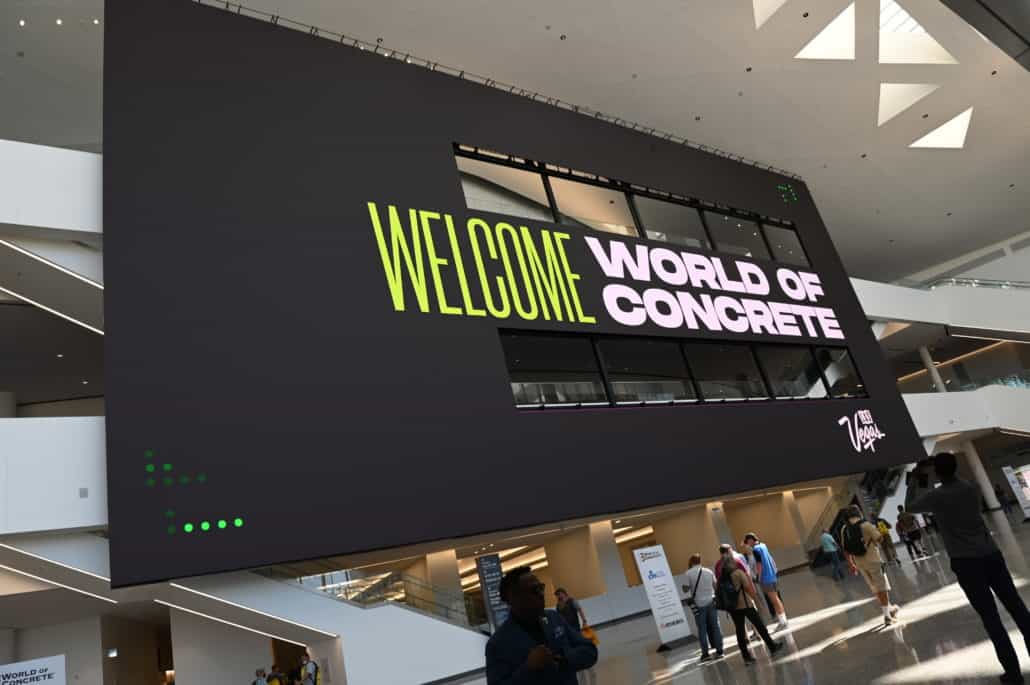In the decades prior to C-19, the meeting badge had evolved from an essentially plain vanilla choice to a tutti-frutti of available options; some extremely beneficial, others simply feature-bloated solutions in search of a problem.
As with many aspects of business events, the C-19 lockdown has provided an excellent opportunity for re-evaluation and fine-tuning. And while some changes will certainly be C-19 mandated, they could also truly reflect improvements, that, while always available in some form, were not considered or implemented due to status quo inertia and/or legacy financial considerations. That includes whether to badge or not to badge.
World Of Concrete Makes a Concrete Decision
While there are a number a major live events currently or soon be be held, I’ve focused on Informa’s World of Concrete (WOC) in Las Vegas due to its size and location as an excellent example and possible barometer of things to come.
WOC eliminated badges altogether, with all entrance, ticketing, and info exchange done via smartphone (or tablet as well, I assume); with help provided at registration for those who don’t have a device. A key element is that a separate mobile app was not needed. The devices’ existing mobile wallet function (ios/android) was all that was required—a feature I believe most attendees greatly appreciated.
However, one key issue with the model regardless of the digital and sustainability benefits, is the absence of an instant, simple, pre-conversation Name & Company ID “ice-breaker” device (aka, a badge). A cursory review of anecdotal attendee and exhibitor comments regarding previous badge-less events indicated a split opinion; while some were happy to be anonymous at their discretion, a majority preferred some sort a quick intro item. Some even suggested they might bring their own, self-made badges!
* It’s important to note that while badging has been the norm in the US for decades, many contemporaneous major European events did not badge attendees… and business still flourished.
Concurrent with the WOC approach, some shows are using a system where the attendee self-prints their badge in advance of the show, and simply inserts it into a traditional holder/lanyard distributed at the show, certainly cutting down much physical interaction in registration and speeding up the process as well. However, these systems either use QR type codes on the printed badge and/or use proprietary mobile apps and digital transmission gizmos for data exchange, tracking, etc. Obviously, this system does allow for all of the advertising based revenue-producing features of modern trade show registration badges, lanyards, and accessories; along with providing the “ice-breaker” visual ID. This model adds the issue of proprietary systems and waste materials.
A Universal Badge Solution
I suspect many readers have been a approaching some variation of the following solution:
- Self-printed badges on badge-size copy paper for initial brass-tack ID purposes only. Templates would be distributed digitally; perhaps even allowing space for including optional conversation ice-breaking info; business and personal. This would allow for the traditional badge-holder ad revenue, ideally done in a sustainable fashion; eg: diligent empty badge-holder return; recyclable lanyard materials, etc.
- Most importantly: The above used in combination with a registration, ticketing, data exchange, and opt-in tracking system all built into an industry-recognized standardized mobile ios/andriod wallet system that could be used seamlessly across all manner of b2b events. It could be separate from the show information and directory digital app, if desired. The key is universal application. There are currently excellent proprietary event wallet systems, but they are all supplier-/show-specific.
- There would be an agreed upon industry standard where essential, general event boiler-plate personal and company data is stored in standardized fields. There would also be functionality to add additional, show-specific fields, and there is the possibility for additional optional fields for the attendee to give information regarding their specific business and personal interests. All info could be revised by the attendee at any time. The universal event wallet could be used for pre/onsite registration for all of an individual’s b2b events; it would eliminate much repetitive info input, and ideally speed the time to “complete registration and submit payment.” Of course, this info also could always be merged into proprietary systems, if desired.Your thoughts? Reach Robert Weissman, president of Alliance Media Strategies, at [email protected]
You Might Also Be Interested In
Why You Should Care That Millennials Are Live-Streaming









